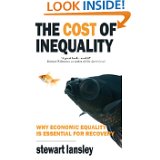Anybody who is concerned about the gap between top and bottom incomes in our society will enjoy reading Stewart Lansley’s [amazon_link id=”1908096292″ target=”_blank” ]The Cost of Inequality: Why Economic Equality is Essential for Recovery.[/amazon_link] The book does a good job of joining the dots between different pre-crisis trends – the divergence of incomes and the ‘disappearing middle’ in the jobs market, the growing debt burden as people borrowed to consume as well as buy houses, the housing bubble itself, banking deregulation, the worship of shareholder value, mega-bonuses. While little of this is wholly new, it is assembled here in a way that makes it obvious why the pre-crisis economy was unsustainable.

Along the way are some thoroughly attention-grabbing points. For example, I knew that income inequality in the US and UK had returned to close to 1920s or 30s levels. Lansley adds this has occurred: “….despite much more mature democracies and regulated economies.” (p22) He’s quite right to raise the implicit question about how on earth this was able to happen. The book is also strong on the links between the emergence of the global mega-rich and the bubbles in asset markets and dysfunctional financial sector activity, and on the feedback effects between inequality and finance – not least the growth in household debt that Raghuram Rajan put centre stage in [amazon_link id=”0691152632″ target=”_blank” ]Fault Lines[/amazon_link].
[amazon_image id=”0691152632″ link=”true” target=”_blank” size=”medium” ]Fault Lines: How Hidden Fractures Still Threaten the World Economy (New in Paper)[/amazon_image]
I would disagree with Lansley’s assertion (p27) that economic orthodoxy says inequality is essential for growth. Conventional economics says there are two countervailing effects of inequality. To quote myself (ahem) in my Joseph Rowntree Foundation Lecture of last year: “Inequality could imply a large pool of savings to finance investment, entrepreneurship or a tax system that is not too progressive and so does not discourage work effort. These would boost growth. Alternatively, inequality could reduce the incentive of poor people to acquire education, or might increase social and political instability, either of which will reduce growth.”
I was surprised to read that in 1998 there had been a City debate on inequality, with George Cox of LIFFE arguing that rich City workers were good for the economy because of their spending, and Andrew Winckler, former CEO of the Securities and Investment Board, arguing that the City had become “smug and complacent” and that “the current bonus system encourages a degree of speculation that is not warranted and is rewarding failure.” (p78) Winckler was proved right. As the book points out, the original ‘robber barons’ at least built businesses; the current lot speculate and consume. They are rentiers.
The book’s main theme is the deathly, damaging embrace of inequality and finance, and Lansley’s solutions lie in the realm of financial regulation. Without a prosperous middle class, he argues, the economy can not recover. He will surely welcome the EU’s bonus cap, even if bankers are shocked (as the caption on a Banx cartoon had one banker saying to another: “Cap our bonuses? After everything we’ve done for the world?”).
However, I think this book – although far, far better argued than the famous/notorious [amazon_link id=”0241954290″ target=”_blank” ]The Spirit Level: Why Equality is Better for Everyone[/amazon_link] in terms of establishing causality from inequality to wider economic damage – will also speak mainly to readers who already believe that argument before they start reading. This is partly just style, as it’s written in a colourful, polemical way that’s bound to have the converted cheering in the aisles. But it is also partly that there is a more complicated story. Inequality has many interacting causes; capping bank bonuses alone won’t fix it, welcome and essential as the cap is (even Martin Wolf in the FT says so!)
I’m certain there is also a strong argument to be made about the way high incomes are parlayed into political power which rigs regulation in favour of incumbents; they are then able to block competition and entry, which, over time, reduces the economy’s potential growth. The financial sector plays a central role in this too, through both its own oligopoly power and its encouragement of M&A through the economy, but the power grab extends to other sectors too. I just haven’t seen the argument set out anywhere in exactly this way.
Having said that, [amazon_link id=”1908096292″ target=”_blank” ]The Cost of Inequality[/amazon_link] gives an excellent birds-eye view of the malign consequences of the financial sector-driven, unsustainable increase in inequality, and of the damage that has caused the US and UK economies. The book concludes: “Allowing the fruits of growth to be so unevenly shared is the real cause of this crisis. If the distribution of national income had been maintained at its level of three decades ago, idle surpluses would now be being spent, and we would be well on our way out of this economic deadlock.”


